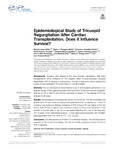Epidemiological study of tricuspid regurgitation after cardiac transplantation: does it influence survival?

Ver/
Use este enlace para citar
http://hdl.handle.net/2183/30474Coleccións
- INIBIC-ICATC - Artigos [174]
Metadatos
Mostrar o rexistro completo do ítemTítulo
Epidemiological study of tricuspid regurgitation after cardiac transplantation: does it influence survival?Autor(es)
Data
2022-03-21Cita bibliográfica
López-Vilella R, Paniagua-Martín MJ, González-Vílchez F, Donoso Trenado V, Barge-Caballero E, Sánchez-Lázaro I, et al. Epidemiological study of tricuspid regurgitation after cardiac transplantation: does it influence survival?. Transpl Int. 2022;35:10197
Resumo
[Abstract] Background: Tricuspid valve disease is the most frequent valvulopathy after heart transplantation (HTx). Evidence for the negative effect of post-transplant tricuspid regurgitation (TR) on survival is contradictory. The aim of this study was to analyze the causes of post-transplant TR and its effect on overall mortality. Methods: This is a retrospective observational study of all transplants performed in two Spanish centers (1009 patients) between 2000 and 2019. Of the total number of patients, 809 had no TR or mild TR and 200 had moderate or severe TR. The etiology of TR was analyzed in all cases. Results: The prevalence of moderate and severe TR was 19.8%. The risk of mortality was greater when TR was caused by early primary graft failure (PGF) or rejection (p < 0.05). TR incidence was related to etiology: incidence of PGF-induced TR was higher in the first period, while TR due to rejection and undefined causes occurred more frequently in three periods: in the first year, in the 10-14-year period following HTx, and in the long term (16-18 years). In the multivariable analysis, TR was significantly associated with mortality/retransplantation (HR:1.04, 95% CI:1.01-1.07, p:0.02). Conclusion: The development of TR after HTx is relatively frequent. The annual incidence depends on TR severity and etiology. The risk of mortality is greater in severe TR due to PGF or rejection.
Palabras chave
Aetiology
Heart transplantation
Prognosis
Survival
Tricuspid regurgitation
Heart transplantation
Prognosis
Survival
Tricuspid regurgitation
Descrición
Observational study
Versión do editor
Dereitos
Atribución 3.0 España
ISSN
0934-0874






